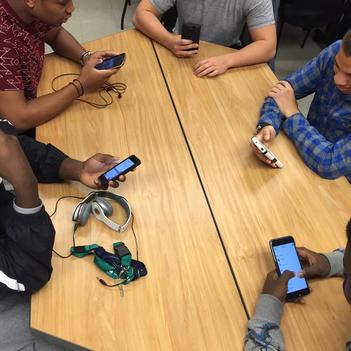 An unstaged picture taken before one of my classes began several semesters ago. An unstaged picture taken before one of my classes began several semesters ago. In “Can’t or Won’t: The Culture of Helplessness,” Professor Lori Isbell bemoans the growing reluctance of undergraduate students to take responsibility for their own educations. Citing emails from her composition students about deadlines and other obvious, easily answered questions, Isbell hypothesizes students either don’t know how to take control of their learning experience or they just don’t want to try. According to Isbell’s colleague, students email questions that are answered in assignment sheets or course texts to delay working on the assignment or perhaps to elicit the instant gratification they are used to receiving from the technology they’ve grown up with. Isbell agrees with her colleague on this possible explanation but she also sees universities, like her own, allowing for this helplessness by offering credit-bearing student success courses and mandating prompt faculty response times. Ultimately, Isbell is exhausted by the continuous volley of responsibility between professor and student tiring and regrets that it comprises the majority of her interaction with students. As much as I wish I could, I can’t pretend I don’t get these emails from students. The “when is this due?” and “what are your office hours?” questions are sometimes emailed, sometimes asked in person. Like Isbell, I wish they’d remembered these things from our first week conversations or their careful syllabus reading. At times I answer these little questions quickly, other times I suggest the syllabus, and yet other times I honestly admit that I don’t remember off the top of my head and I don’t want to tell them the wrong thing. Thankfully, these basic, easily answered questions are not, as Isbell reports, the majority of questions I get from students. Maybe it’s this difference in volume that allows me to see these emails in another way. While I know there are and will always be students who don’t take responsibility for their own learning, I don’t think this is a new issue to be blamed on technology, millennials, or the public school system. Their reasons for shirking responsibility are as diverse as they are and most times I will never be privy to those reasons. These students exist, yes, but I don’t think every email about a basic question already answered on an assignment sheet belongs to one of these irresponsible students. I don’t think we should even assume that most of these questions come from these students. I actually see a very different possibility when it comes to these emails. In psychology, the concept of cognitive load theory explains that our brains only have so much room for cognitive processing. Greg Ashman discusses this in his article, "Why students make silly mistakes in class (and what can be done about it)." As Ashman explains, when we are learning new and difficult things, our brains devote lots of processing power to that new and difficult thing. This can mean that other, more basic things we could easily handle yesterday are now complicated again, simply because we can’t devote the same amount of cognitive processing to them today as we did yesterday. This is why we might forget to specify units when doing Physics homework or why we struggle to get the breathing right when learning to swim a new stroke. Something we’d feel silly for forgetting normally suddenly becomes one too many things for our learning brains to juggle. In composition, students learning to synthesize research might forget to add a source to their Reference list because they’re so focused on incorporating quotations smoothly. Applying cognitive load theory to the composition classroom helps me find a more charitable read for these seemingly helpless student questions. When a student asks what they need to bring tomorrow rather than reading our schedule, I try to think of it as one little piece of the cognitive load I can share with them. If I field an easy question, they can devote more processing power to the tough concepts. Student Success courses do the same by helping students transfer basic skills (like how to write an email or approach a faculty member) to their new environment. I’ve been teaching first year students for 12 years now, so it’s easy for me to forget how scary my first year as an undergrad felt. When I find myself getting frustrated, I remind myself what it was like to be a first year student: constantly bombarded with new concepts, experiences, and demands each hour. I think back to the time I stood in my dorm room kitchen making a peanut butter and jelly sandwich in a panicked fog because I couldn’t decide how to prioritize the major projects due that week that I was so far from being done with. I can easily imagine that younger version of myself asking a little question that would seem deflective or avoidant to a faculty member. But I also remember how badly I needed someone to direct me, even just on how to start working. Looking back, I’m sure I was missing a helpful resource I had simply forgotten in the flood of information I was taking in. If answering a quick email or pointing a student back to a resource is the difference between them crying over peanut butter and sitting down to work, then I’m happy to do it. The way I see it, maybe each student who asks a seemingly helpless question is devoting their cognitive focus to the critical thinking this class requires. The reality is probably halfway between me and Isbell’s takes, but my Prairie Dawn optimism will always pull me to the best case scenario. For my teaching style (and to be honest, my morale), this view on the little questions will keep me happy while teaching and emailing. I also know that each email I send affects that student’s odds of asking another question. If I can be helpful over a little question, maybe soon they’ll be willing to ask me the big ones too.
0 Comments
|
Amanda J. HedrickStory collector, recipe enthusiast, educator, striving for a constant input and output of all things art and learning. Archives
September 2022
|

